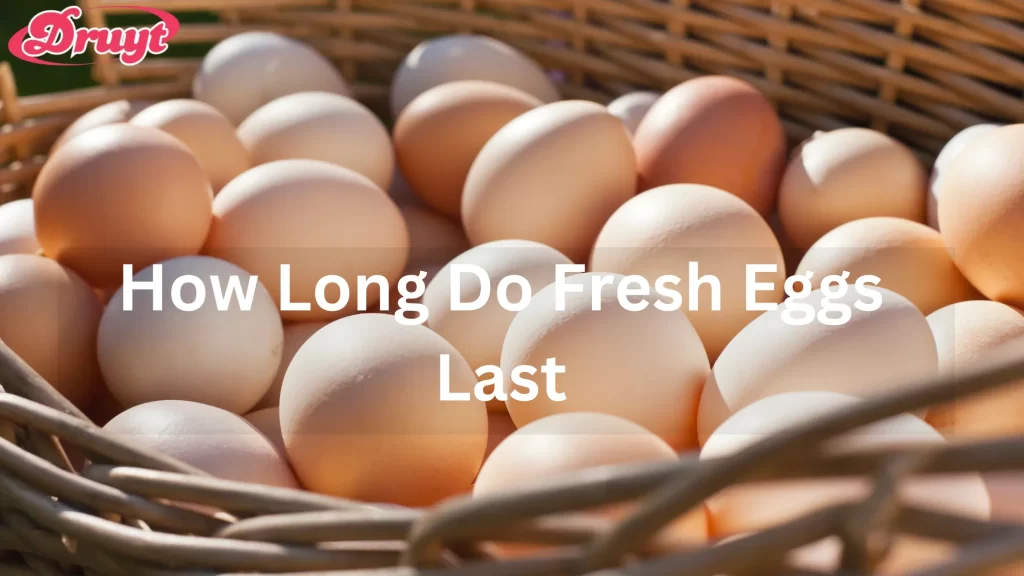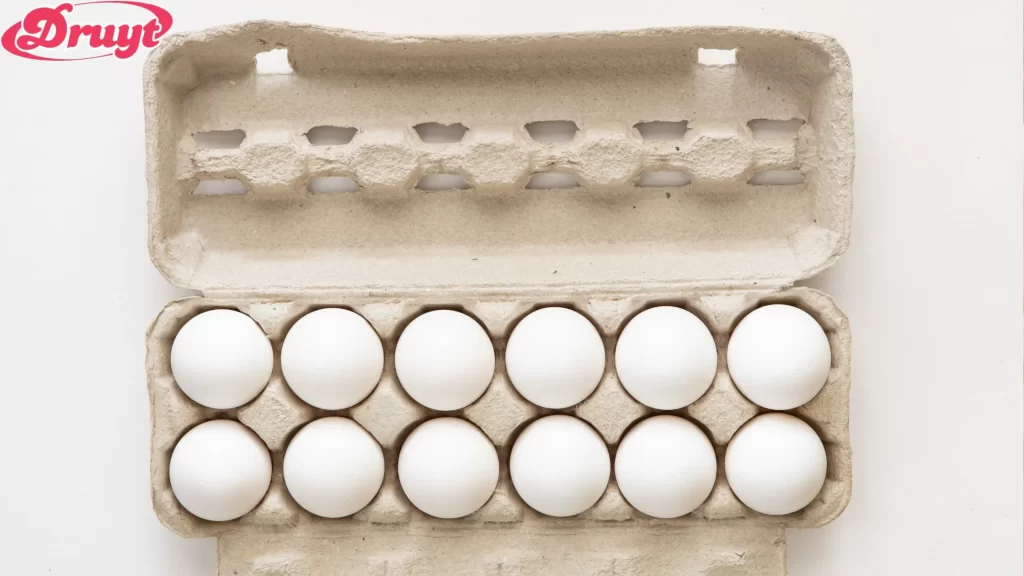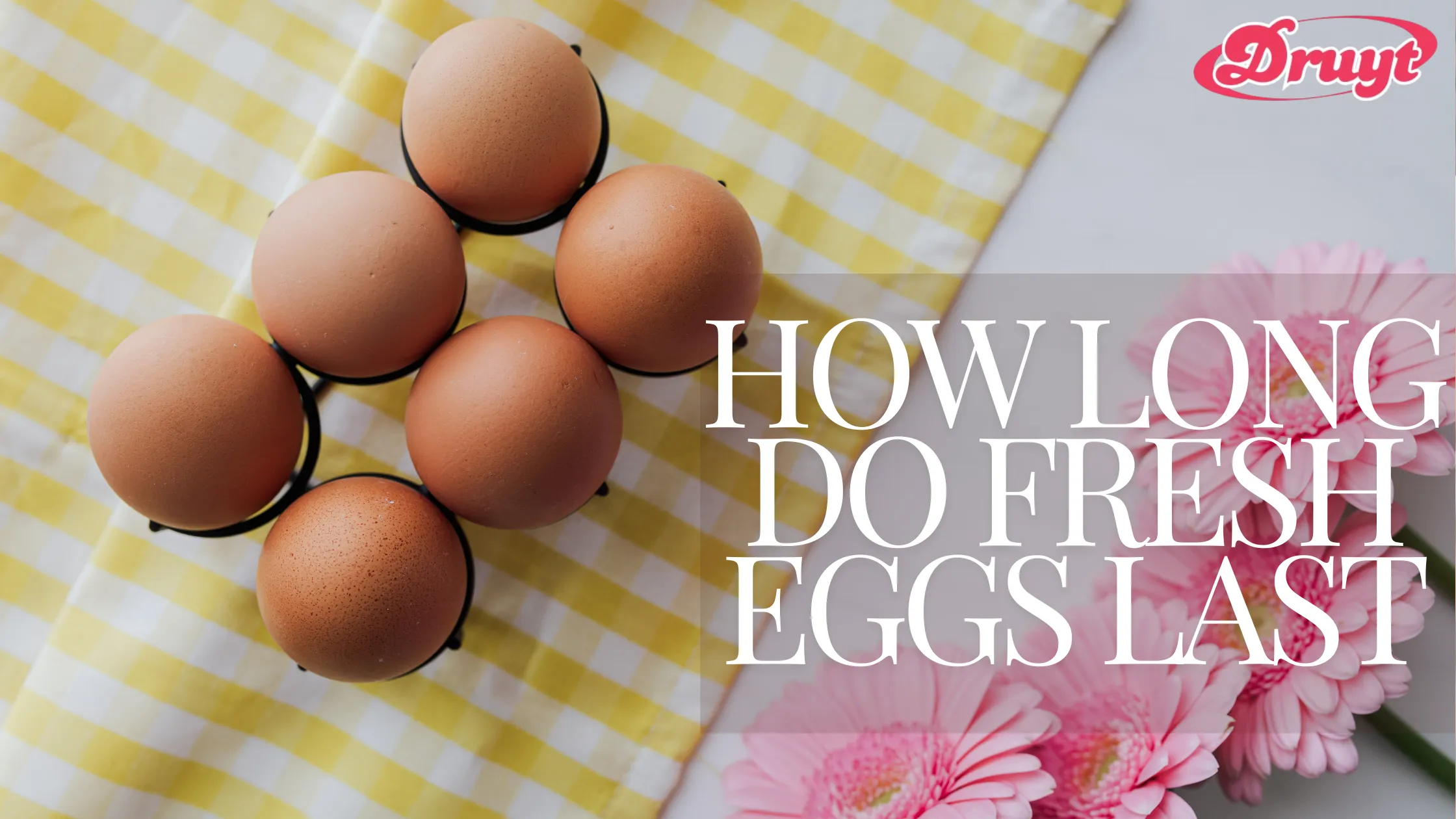Table of Contents
When you ask, “How long do fresh eggs last?” You’re considering more than simply flavor; food safety is just as crucial. Eggs are prone to spoilage if not stored correctly, leading to the risk of foodborne illnesses. Proper egg handling can prevent wasted food and keep you and your family safe.
In this article, we’ll discuss how long fresh eggs last at room temperature, in the fridge, and even in the freezer. You’ll also learn handy tips for extending their shelf life and avoiding spoiled eggs.
How Long Do Fresh Eggs Last at Room Temperature?

You might wonder, “Is it safe to leave eggs out on the counter?” The response will depend on whether the eggs have been washed. In some parts of the world, like the U.S., eggs are washed to remove bacteria, which also strips away the protective coating. This means eggs need refrigeration to stay fresh. However, in other countries, eggs are left unwashed, retaining their protective coating and making them safe to store at room temperature.
Unwashed Eggs:
Farm-fresh, unwashed eggs can last at room temperature for up to two weeks. The natural coating (called the cuticle or bloom) keeps bacteria out and moisture in, protecting the egg from spoilage. If you’re buying eggs from a farmer or collecting them from your own chickens, you can safely store them on the counter for a short period.
Washed Eggs:
Once eggs are washed, as is standard with store-bought eggs, they need to be refrigerated. Leaving them out for more than a couple of hours increases the risk of bacterial growth, which can lead to foodborne illnesses. To keep them safe, it’s best to put them in the fridge right after purchasing.
Also Read: Can You Freeze Coleslaw? Discover the Surprising Truth
How Long Do Fresh Eggs Last in the Fridge?

Refrigeration is the most reliable way to extend the shelf life of your eggs. But how long do fresh eggs last in the fridge? The answer depends on whether the eggs are farm-fresh or store-bought.
Farm-Fresh, Unwashed Eggs:
When stored in the refrigerator, unwashed eggs can last up to three months. The cool environment significantly slows the aging process. The eggs remain fresh and safe to eat for a long time, even if they were collected a week or two before you bought them.
Store-Bought, Washed Eggs:
Store-bought eggs typically last four to five weeks in the fridge. This timeline is based on the “sell-by” or “expiration” date on the carton. However, eggs are often still safe to eat for a week or two beyond that date if they have been properly stored in the fridge.
Also Read: How Much Does a Potato Weigh? Shocking Truths You Need to Know!
Tips for Storing Eggs in the Fridge:
- Keep Eggs in Their Original Carton: Egg cartons are designed to protect the eggs and prevent them from absorbing strong odors from other foods in the fridge. They also keep the eggs from losing moisture.
- Store Eggs in the Main Fridge Compartment: Many people place eggs in the fridge door, but the main compartment maintains a more consistent temperature. The door is exposed to frequent temperature changes, which can shorten the shelf life of eggs.
- Place Eggs Pointy-End Down: Eggs naturally have an air pocket at the larger end. Storing eggs with the pointy end down helps keep the yolk centered and preserves freshness.
How to Tell If Eggs Have Gone Bad

No one likes the idea of using bad eggs in their cooking. Luckily, there are several easy ways to check if your eggs are still fresh.
1. The Float Test:
The float test is a simple and reliable method to check egg freshness. Pour some water into a bowl and carefully drop the egg into it. An egg is fresh if it sinks and rests flat on the bottom. It’s ancient if it floats or stands straight. This happens because, over time, eggs lose moisture and air enters the shell, causing the egg to become buoyant.
2. Crack It Open:
You can also test freshness by cracking the egg into a bowl. Thick whites and firm yolks characterize fresh eggs. As the egg ages, the whites become runnier, and the yolk may flatten or break easily. If the egg looks watery, it’s a sign that it’s not as fresh anymore.
3. Smell the Egg:
A bad egg has a distinctive, unpleasant odor, even when it’s cooked. If you crack open an egg and notice a sulfur-like smell, discard it immediately. Fresh eggs don’t have a strong smell, so trust your nose!
How to Keep Eggs Fresher for Longer
Want to make your eggs last even longer? Here are some simple yet effective tips to extend their freshness:
1. Store Eggs in Their Original Carton:
As mentioned earlier, the egg carton plays a crucial role in protecting the eggs from absorbing odors and preventing moisture loss. Always store eggs in their original carton, even if they are farm-fresh eggs from a local source.
2. Keep Eggs in a Consistently Cold Environment:
Refrigeration is key to extending the lifespan of eggs. To avoid unnecessary temperature fluctuations, store them in the middle or back of the fridge, where it’s coldest. Avoid placing eggs in the door where temperatures can fluctuate each time you open and close it.
3. Freeze Extra Eggs:
If you have more eggs than you can use, freezing them is a great way to prevent waste. Crack the eggs into a container, lightly beat them, and freeze them in an airtight container. Eggs can be kept for up to a year in the freezer. When you’re ready to use them, just thaw them overnight in the fridge.
Can You Eat Eggs After the Expiration Date?
Egg cartons usually come with a “sell-by” or “best-by” date, but what if your eggs are past that date? Can you still eat them?
Understanding Expiration Dates:
The “sell-by” date on an egg carton is more of a guideline for stores rather than an expiration date for consumers. Eggs can often last for several weeks beyond this date if stored correctly in the fridge. The key is to check the eggs for freshness using the float test, smell, or appearance before consuming them.
Trust Your Senses:
Instead of relying solely on the date on the carton, use your senses to determine if the eggs are still good. If they pass the float test and don’t have any off smells or appearances, they’re likely safe to use.
Also Read: How Long Do Fresh Eggs Last? Essential Tips
What’s the Best Way to Use Older Eggs?
If you have eggs that are nearing the end of their freshness, don’t toss them! There are still plenty of ways to use them. In fact, older eggs can be ideal for certain types of cooking.
Boiling Eggs:
Older eggs are easier to peel after boiling. The small air pocket inside the egg expands as it ages, making the shell easier to remove. So, if you’re planning to make hard-boiled eggs, those slightly older eggs are a great choice.
Baking with Older Eggs:
In baking, slightly older eggs work just as well as fresh ones. Their slightly runnier texture won’t impact most baked goods. Use them for cakes, cookies, or even muffins without any issues.
Scrambled Eggs or Omelets:
Eggs that are closer to their expiration date are also perfect for scrambled eggs or omelets. Since texture isn’t as important in these dishes, you can use up older eggs without any noticeable difference.

